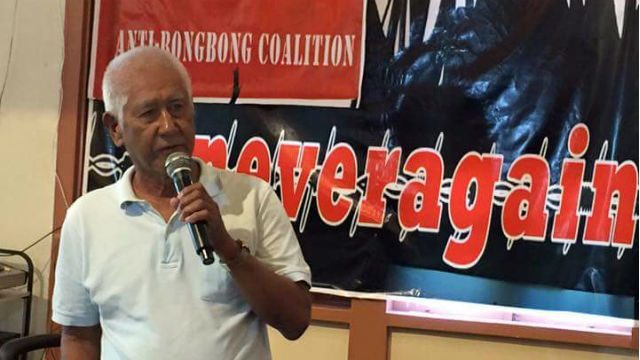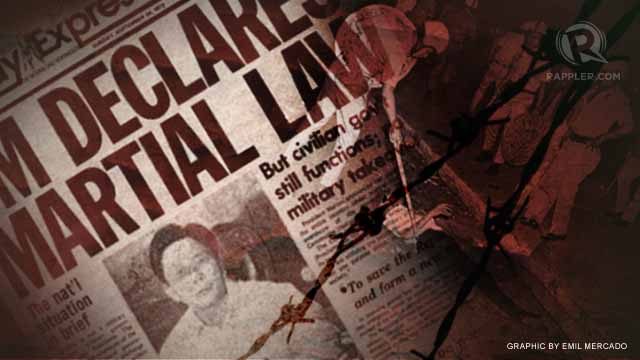SUMMARY
This is AI generated summarization, which may have errors. For context, always refer to the full article.

CEBU CITY, Philippines – Some millennials on social media praise the “glory days” of the late dictator Ferdinand Marcos, who served from 1965 to 1986.
They yearn for the return of discipline and “strongman” rule to a country that has yet to rise above endemic corruption and poverty. The 1986 EDSA Revolution was a fluke and “things were better those days,” they argue.
Marcos’ son, Ferdinand “Bongbong” Marcos Jr, won a seat in the Senate in 2010, and is gunning for higher office in May. Those who suffered human rights abuses under the Marcos regime are alarmed by the latest surveys showing him sharing the lead with Senator Francis Escudero in the vice presidential race.
Their concern stemmed from the statements the vice presidential candidate had made in response to questions about the atrocities committed during his father’s regime.
When asked by a reporter if he should say sorry for his father’s mistakes, the senator replied: “Will I say sorry for the thousands and thousands of kilometers [of roads] that were built? Will I say sorry for the agricultural policy that brought us to self-sufficiency in rice? Will I say sorry for the power generation? Will I say sorry for the highest literacy rate in Asia? What am I to say sorry about?” (READ: Marcos on dad’s regime: What am I to apologize for?)
When President Benigno Aquino III said that the Marcoses should apologize for the human rights abuses during martial law, the senator said it is Aquino who should move on.
Scarred for life
But for Romulus Dingcong, 63, “moving on” is not an option – even if he wanted to.
That’s why he and other members of Selda, a coalition of surviving martial law victims in the Philippines, are campaigning against Marcos’ bid for the vice presidency.
“Ang pamilyang Marcos, sa ilang dugo, naa ang pag-abuso (Abuse is in the blood of the Marcos family),” Dingcong said.
The group recently launched a campaign in Cebu where it plans to hold counter demonstrations and other activities to try to derail Marcos’ bid. Dingcong told Rappler his story at the sidelines of one of Selda’s events in this city.
He was arrested in 1974, two years after martial law was declared.
It is now 2016, but he still remembers every painful detail.
“Ang akong nahinumduman, kadtong pagtorture nako (I can still remember being tortured),” he told Rappler. (READ: QUIZ: Would you have survived martial law?)

Dingcong was an 18-year-old student activist at Colegio San Agustin in Bacolod when he was arrested.
”Ila kong gikolata. Gigamit pud nila ang butt sa armalite (They beat me. They also used the butt of an armalite to beat me),” Dingcong recalled.
The beatings led to lung injuries and pain in his ribs which he still suffers from today. (READ: Worse than death: Torture methods during martial law)
Dingcong was tortured for a month at a military camp before he was transferred to the Philippine Constabulary headquarters in Bacolod City. “Sometimes they would interrogate, other times they just enjoy beating me,” he said in Visayan.
He was detained for over 3 years. His sentence was extended a few times after being accused of plotting to escape.
Sometimes the soldiers would threaten to kill him in prison, but he was eventually released in Cebu. His release was conditional and he was not allowed to return to Negros.
”Even after I left the prison, I was constantly monitored. They wanted to make sure I wasn’t going to join the rebellion or get involved again with the activists,” he said.
Upon release, the Redemptorist Church took him in and allowed him to stay at the seminary while he was looking for a job.
But even the church was no refuge for Dingcong.
“Gibadlung sila kay hadluk sila basin ma-influence ang mga seminarista (They scolded the priests for letting us stay because they were afraid the seminarians would be influenced),” Dingcong said.
After his release, Dingcong eventually got married and settled in Cebu City.
‘Don’t forget’
Although the Marcoses were forced to leave Malacañang following the EDSA Revolution, Dingcong recognizes that the Philippines has yet to achieve full economic and social justice. “Samut kadaghan og corrupt sa Pilipinas (There are even more corrupt in the Philippines now),” he said.
But he has no doubt that putting a Marcos back in office would not be the answer, as the late strongman’s children have not recognized his wrongdoings.
“Sa iyang anak karun, ang problema, kay dili mo angkon sa sala sa iyang amahan. Dili siya angayan ibalik sa Malacañang (The problem is his children don’t want to admit the wrongdoings of their father. Bongbong’s not fit for Malacañang),” Dingcong said.
He cautioned the youth: “Dapat i-open ilang mind unsa atong naagi adtong martial law (They should really open their minds to what happened during martial law).“
”Wala pa gani nato nadawat ang award para sa mga human rights victims (We haven’t even received the award for human rights victims),” he added.
Dingcong also said, “Ug wala pud ta kahibalo kung mamatay ang presidente na lansaron (ni Imelda) iyang anak pagkapresidente (We also don’t know if Imelda is pushing him to become president if the sitting president would die).”
With Bongbong’s numbers rising in the surveys, is it too late now to derail his campaign? Dingcong said he would not let even his age stop him from trying.
This election, he wants to tell the youth, “Ayaw’g kalimti mga ngitngit nga panahon (Don’t forget the dark days).” – Rappler.com
Add a comment
How does this make you feel?
There are no comments yet. Add your comment to start the conversation.